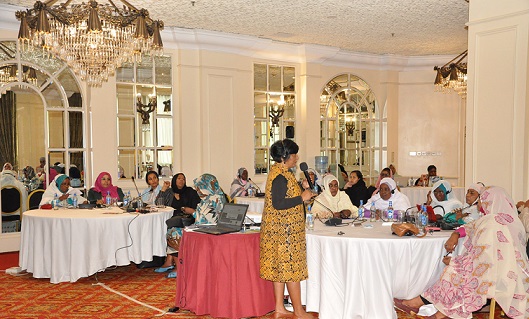
11.09.2019 (Nairobi, Kenya): The Mediation Support Unit (MSU) under the Intergovernmental Authority on Development (IGAD) in collaboration with the African Centre for the Constructive Resolution of Disputes (ACCORD) are conducting a Training of Trainers workshop to enhance capacity of Sudanese women in conflict prevention and mediation as well as their role in peace building within the context of UNSCR 1325 which was adopted by the Security Council at its 4213th meeting in 2000.
UNSCR 1325 reaffirms the important role of women in the prevention and resolution of conflicts, mediation and peace-building. It stresses the importance of their equal participation and full involvement in all efforts for the maintenance and promotion of peace and security, and the need to increase their role in decision-making with regard to conflict prevention and resolution.
In his official opening remarks the Director of Mediation Support Unit (MSU), Dr. Aleu Garang highlighted IGAD’s commitment and dedication of partners like ACCORD, the European Union (EU) and the Austrian Development Agency (ADA) on women engagement in peace processes, enhance their capacities to identify, understand the root causes of conflicts and opportunities to prevent and manage conflicts both at the community and national level.
“We want women to use their positions, influence, role as mediators and negotiators at different levels and as participants in different forums to play a part in peace building and decision making to resolve conflicts using their multiplier effect to train others and reach many others at community, national and regional levels” Dr. Garang went on to say.
Trainings such as this coupled with advocacy, policy influence of women and importance of skills transfer have necessitated IGAD to develop tailored capacity building interventions and use an informed approach in creating spaces for women to engage in peace processes.
As a result, it is envisioned there will be implementation and adoption of National Action Plans (NAPs) to address the challenges of weak national frameworks, lack of financial support for Local NGOs and CSOs and issues around patriarchy, culture and male bias on inclusion in the IGAD region.
The training is being conducted through the support of the European Union Trust Fund (EUTF) managed jointly by the Austrian Development Agency (ADA) and IGAD under the IPPSHAR Programme.

BACKGROUND
- MSU in its efforts to enhance the role and participation of women in conflict prevention and mediation processes conducted assessments in Somalia, South Sudan and the Sudan.
- A combination of desk and field research in 2018 was employed comprising of researchers from MSU and ACCORD used focus group discussions and interviews of specific individuals, as well as email discussions to gather information on progress. The Sudanese women capacities were assessed in light of peace building, mediation trainings that took place in the country with aim to strengthening their capacities on conflict transformation, peace building and their engagement in both peace processes and implementation of peace agreements.
- The report gave an overview of conflicts in the Sudan that includes the war between the North and the South that erupted one year before the country attained its independence on 19 December 1955 with a parliamentary vote which then took effect on 1 January 1956, despite its first armed conflict that erupted in August 1955 and the impact on women.
- The report acknowledge many capacity building opportunities on mediation and peace-building by different partners, also identified repetitive trainings and lack of coordination between actors as a major gap. The research established lack of accessibility to remote areas by the various actors and the missing link between the high-level, government and the grassroots women as a challenge in enhancing women capacities to work in conflict prevention and participate in mediation and peace processes.
- Additionally, the assessment documented analysis of capacities and impacts of Women’s participation in conflict mediation, negotiations and peace agreements implementation. It was noticed, the weak participation of women in the political processes, governance structures in the Sudan and mediation in the processes examined.

